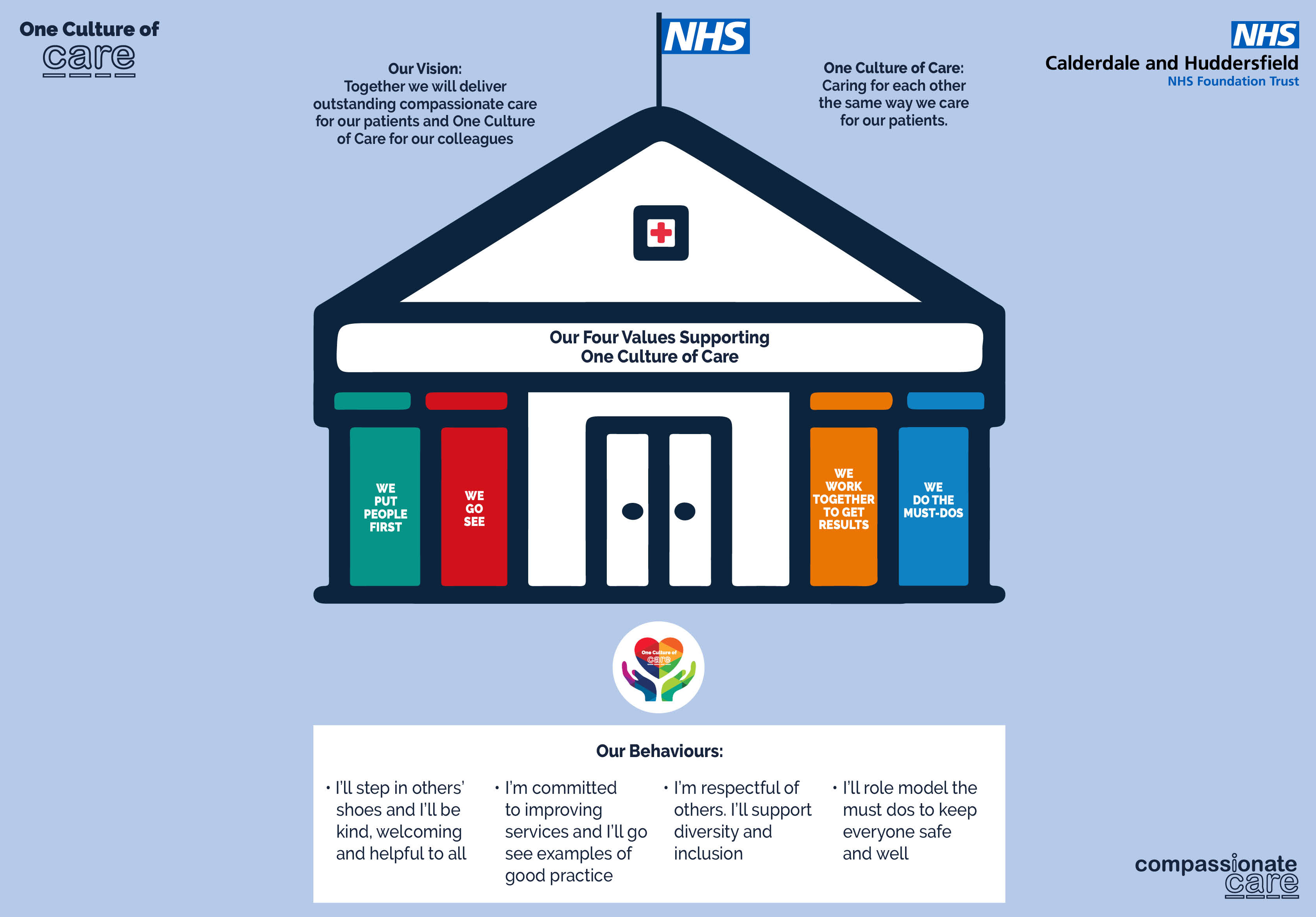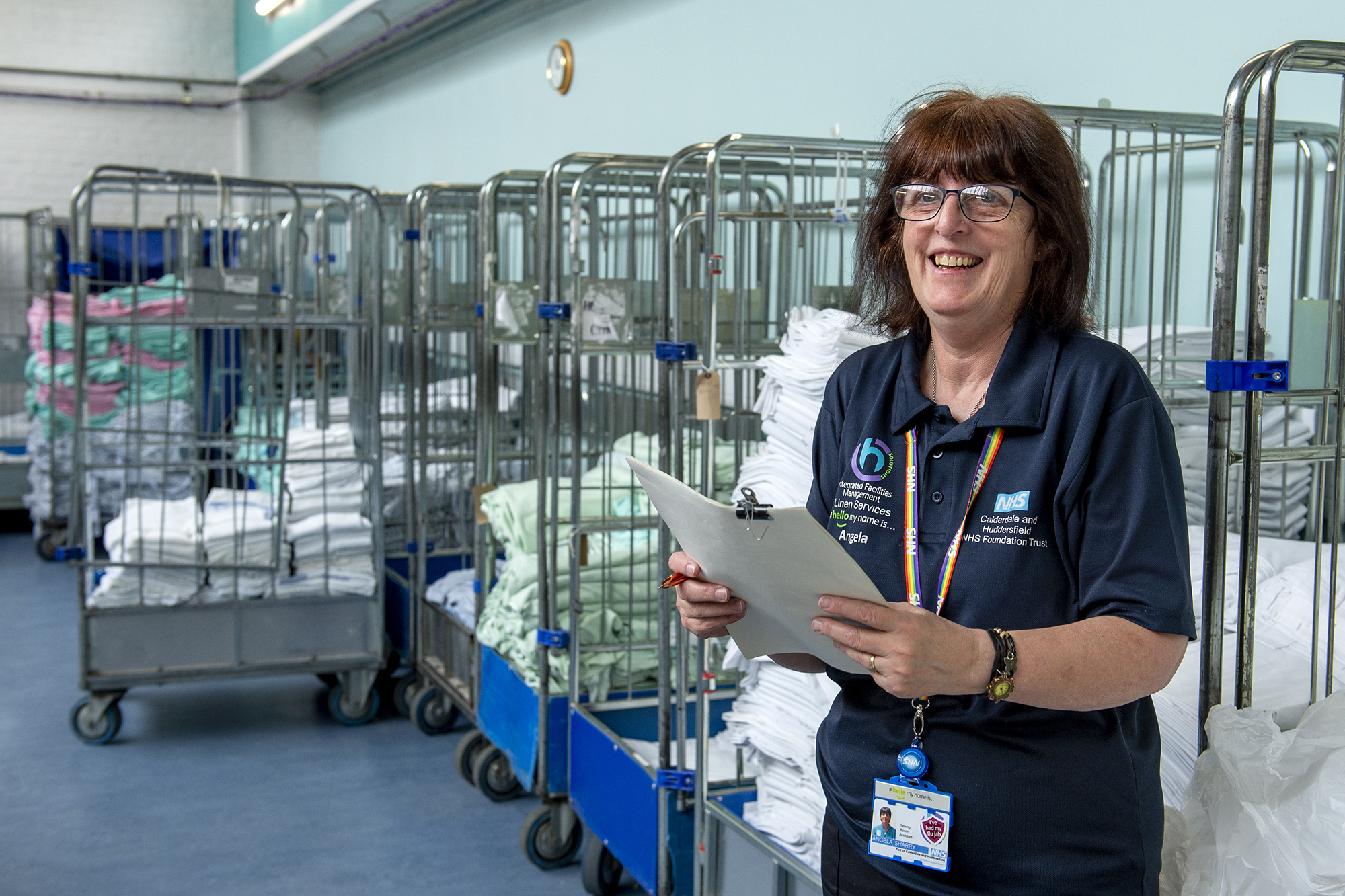Our values
Calderdale and Huddersfield Solutions Ltd (CHS) recognises that its’ staff are its greatest asset and that its business is its’ people. It is important that the values of CHS reflect the Trusts values so we can act as an enabler for clinical and non-clinical teams to provide the best possible service for patients.
Calderdale and Huddersfield Foundation Trust's (CHFT) values and behaviours underpin the vision of the Trust and these are the values that all employees of CHS are expected to adopt.

Our Vision: Together we will deliver outstanding compassionate care for our patients and One Culture of Care for our colleagues.
One Culture of Care: Caring for each other the same way we care for patients.
Our Behaviours: I'll step in others' shoes and I'll be kind, welcoming and helpful to all. I'm committed to improving services and I'll go see examples of good practice. I'm respectful of others. I'll support diversity and inclusion. I'll role model the must dos to keep everyone safe and well.
This People Policy outlines our vision for supporting, leading and developing our workforce over the next 3-5 years. Themes from engagement workshops held with staff have been incorporated into this strategy.
Our vision
Our vision is to be an employer of choice. We will support our staff to develop and encourage a drive for all staff to be more commercially aware. Where appropriate we will provide training for staff to help us deliver our commercial strategy, this will include developing knowledge of writing business plans and tenders.
We are committed to reducing waste, improving efficiency and building a sustainable workforce to grow the business. We aim to do this by:
- Being a socially responsible and diverse organisation, growing and nurturing a workforce drawn from our community at all levels of qualification and background.
- Instilling a culture of mutual respect.
- Having a strong focus on learning and development for all staff, to enhance business performance and job satisfaction.
- Providing mentoring and coaching support to navigate training and development opportunities.
- Encouraging creativity and a ‘can do’ attitude.
- Developing a clear apprenticeship strategy offering opportunities across all areas of Estates, Facilities and Procurement that also maximises the potential of our existing workforce who want to progress their careers. The apprenticeship scheme will help the organisation to develop a future workforce offering a real career path through to qualified and skilled positions.
Our behaviours
There are 7 principles with descriptions of associated behaviours to ensure there is clarity about ‘the way we do things around here’ and to understand our expectations of each other.
Be Respectful
- treat everyone with courtesy and respect - be consistently friendly, welcoming and attentive and show kindness, compassion and empathy
- focus on the needs or service users - present a positive attitude and offer 'excellent service with a smile'
- anticipate, listen and respond to the needs of others
- treat others as they would wish to be treated
- respect diversity and value difference
Be Responsible
- accept full responsibility for my words, behaviours, attitudes and actions
- recognise the impact of my decisions
- provide a service that I am proud of
- reflect the Company values in all I do
- act as an ambassador for the organisation
- always give of my best
Be Accountable
- act professionally and consistently at all times
- own what is mine and follow things through
- contribute to my team's collective responsibility
- identify and escalate risks
- add value to the organisation through what I do and how I behave
Be Courageous
- support new ways of working
- offer positive challenge to what we do and how we do it
- seek out and give constructive feedback
- participate in and contribute to frank and honest discussions
- acknowledge and address my development needs
- look for innovative solutions
Be Inspirational
- look for and get involved in opportunities that improve services
- develop myself and my colleagues
- motivate, encourage and support others
- demonstrate the passion and energy I have for my work
- listen to understand - show genuine concern for others
- act with integrity - lead by example and walk the talk
- act consistently
Be Positive
- promote a learning culture not a blame culture at every level
- demonstrate a can-do attitude - 'how can we make this work?'
- identify problems and focus on solutions
- embrace, promote and support change
- keep the 'big picture' in mind
- demonstrate resilience in difficult times
Be A Team Player
- share my ideas, skills and knowledge with others
- recognise, celebrate and share success with my team, other colleagues and the company
- work collaboratively and positively with others across team boundaries to get the job done
- seek to build and nurture new relationships
- recognise and value everyone's contribution
- remember we are all working together
- be loyal to my colleagues, my manager and the organisation
Our strategy
This People Policy sets out what is required for us to deliver our objectives through our people. It seeks to enable and equip our staff with the necessary knowledge, skills experience and attitudes to deliver outstanding performance to facilitate this.
The Policy complements the organisation’s interdependent strategies for sustainability and commercial viability by having the highest standards of leadership and management. We
will embrace the diversity and individuality of people to foster a culture of openness; with capable, motivated and resilient staff.
Our People Policy will be underpinned by the following:
- Staff Engagement Strategy
- Occupational Health and Well Being Strategy
- Staff Survey Action Plans
- Commercial Strategy
- Sustainability Plan
Key indicators of our people policy
Leadership
- It is recognised that teams are more inclusive when they are well-structured, well-led and have effective processes that include clear vision and values; shared team leadership; diversity; and a pattern of listening to and valuing all voices within the team.
- All staff employed by the company will have a clear understanding of the knowledge, skills, experience, and attitudes required and expected of them.
- All staff will know the value of leadership and the contribution that effective, compassionate and inclusive leadership has on the organisation.
- Leaders will exist within the organisation, with the agility and the versatility to gain and sustain commitment to change and improve services and excellence by using the right style to influence and motivate individuals and teams.
- Leaders will influence improved performance and productivity, transformation, commitment and engagement.
- Leaders will be supported by an effective performance management process and be developed to reach their full potential.
This means that:
Our leaders will be visible, approachable and will engage and listen to colleagues. They will act as role models and the organisation will support them to work in a more commercially focussed environment.
Our management of staff will be fair, consistent and even handed; valuing individual and team contribution.
We have identified from the results of our recent staff survey that we need to improve the consistency of performance management and communication across a number of service areas. We will support our managers and supervisors to deliver this objective by providing peer support and bespoke training.
The Company will increase HR capability and capacity within the senior management team and we will empower and train our supervisors, team leaders and managers to take decisions and manage, lead and support staff effectively.
It is important that managers have access to information and guidance to help them line manage their employees effectively. A toolkit will be developed and made easily accessible to line managers on key HR issues including sickness management, capability, flexible working, how to deal with conduct issues and how to manage organisational change successfully.
The toolkit will be supported by ‘quick reference guides’ that will act as a reference tool for topics such as special leave, annual leave and sickness as well as frequently asked questions for each subject matter. The Company’s intranet page will be developed ensuring that it can be easily navigated and that the toolkits and guidance documents are easy to find.
We will have policies and procedures that reflect best practice. Strong, visible and fair line management support will be the key to our staff feeling valued and engaged.
Colleague engagement
- Develop and monitor the on-boarding experience of staff newly recruited to the Company.
- Improve engagement and staff motivation for existing staff by addressing and improving areas highlighted by our staff survey and ensuring that improvement plans are developed and supported.
- Improve our staff survey results and introduce pulse checks/mini surveys for the organisation at regular intervals to gauge how staff are feeling and pick up issues/themes at an early stage.
- Get the basics right by ensuring all of our staff have the right tools and equipment to do their jobs effectively.
- Make sure all staff have a voice.
- Introduce ‘Spotlight awards to celebrate individual good practices.
This means that:
We will look to introduce a ‘buddy scheme’ for new recruits. Currently Estates, Facilities and Procurement lose 12% of new recruits within the first 6 months of employment.
We can improve this by recruiting colleagues whose personal values are aligned to those of the organisation to create a culture of continuous improvement and an organisation that our colleagues are proud to be part of.
The Company expects colleagues to display behaviours that represent its values and those colleagues that work hard and perform well will be offered incentives.
We know from our staff survey that line managers can do better with how they interact with staff. We are already talking to staff about the results and have action plans that are being shared with them.
In addition to the formal channels set out above, ‘listening groups’ have been set up to give representatives from all staff groups a mechanism to talk freely to the senior management team about issues that directly affect them. The groups cover weekend and evening staff and a “you said, we did” infographic is being developed to share with staff.
We will also seek staff feedback by developing our own bespoke staff survey and responses from these will help us improve how we lead, manage and support our staff The Staff Engagement Forum currently in place for non-union colleagues will continue and run alongside the company’s more formal consultation mechanisms.
We will act more quickly on issues raised by staff; feedback is that we do not always do this.
Staff health and wellbeing
Responsibility for health and wellbeing at work belongs to both employers and employees. The key factors that determine whether staff will have a positive or negative relationship with work are:
- Whether employees are involved in organisational issues and decisions and feel empowered and involved in our organisation.
- Job design and versatility of role.
- Appropriateness and volume of workload.
- Availability and acceptability of flexible working.
- Awareness of occupational health issues and encouragement to invest in themselves and their wellbeing.
This means that:
It is recognised that staff want greater flexibility in their working lives and wherever possible the company will aim to provide this, within the parameters of providing a patient centred service. Staff morale is a key focus and we need to respond proactively to recruitment and retention challenges by a more flexible reward offering including offering a range of working patterns that will be attractive to prospective employees.
We want the experience of working for CHS to be a positive one which has a positive impact on the health and wellbeing of our employees. The Company will focus on improving the health and wellbeing of our staff in order to help reduce sickness absence, targeting the increasing number of staff who report being unwell due to stress related issues. It should be noted that the majority of stress reported is outside the work environment and in conjunction with Occupational Health we will sign post staff to support available on a range of issues such as debt counselling, smoking cessation and screening programmes.
We will take positive action on the wellbeing of our staff and utilise the services provided by the Trust’s Occupational Health and Wellbeing service by promoting physical activity and supporting colleagues with a range of initiatives including resilience and stress management training as well as access to mindfulness programmes, a confidential counselling service, ensuring flu vaccination take up and conducting workplace assessments. We will participate in national wellbeing days and mental health first aid programmes.
The Company remains committed to promoting healthy eating and will ensure all food outlets in our hospitals offer a range of healthy food and snacks and the company will continue to support the ‘incredible edible’ and ‘trees for wellbeing’ initiatives.
We will look to introduce a smoke free environment and have rest areas for staff wherever possible. The Occupational Health Service’s comprehensive wellbeing handbook will be issued to all new starters in the organisation as part of their local induction process.
Developing and retaining our talent
- Attract high performing staff and reward colleagues who display the expected behaviours and perform well.
- Reward staff appropriately for improved productivity and efficiency and incentivise staff to create commercial value.
- Develop a clear and flexible approach to alternative working patterns to accommodate the changing needs of our people.
- Promote a more agile based model of working.
- Provide meaningful appraisals for all and development opportunities for staff who wish to progress their careers.
- Consider an ‘Itchy feet’ programme.
- Provide apprenticeships as the norm across the whole range of our services.
- Offer flexible retirement/wind down options for staff.
- Keep abreast of external influences on our workforce ie; Brexit.
This means that:
We will identify talent within our workforce and support individuals to progress their careers.
We will help our staff to develop within their roles and increase their knowledge recognising that a successful business needs experienced staff that can be role models and share learning.
We will consider programmes to make it easier for staff to move round internally and experience a ‘taste’ of other roles The Company will utilise the apprenticeship levy to map to new role development and leadership programmes.
Staff will participate fully in a meaningful annual appraisal which is not seen as a tick box exercise, we will check on this by taking feedback from staff as part of our ‘pulse checks’.
Mandatory and job specific training will be provided to support staff to practice safely.
We will develop approaches that are flexible and attempt to work with people to balance work and home demands at different times in their lives.
We will look to experienced long serving colleagues to play a key role in the development of new staff and we will offer flexible retirement options where possible for staff nearing retirement.
Colleagues from the EU are an important asset to our workforce and Brexit implications mean uncertainty for them. We will support colleagues by providing information and guidance to assist with any questions or concerns they may have.
Inclusion
We aspire to develop a culture where diversity and inclusion is embedded in our attitudes and actions.
We believe the diverse voices of our colleague should be celebrated, we will aim to tackle any barriers that might prevent colleagues from bringing their authentic self to work and we are committed to nurturing a secure and supportive environment where everyone is valued for their contribution.
Our approach complies with the Equality Act 2010 and we commit to making sure there is no unjustified discrimination in the recruitment, retention, training and development of colleagues.
We will strive to:
- Improve individual awareness of cultural difference, including unconscious bias and embrace ideas to improve diversity in recruitment and development processes.
- Work positively with staff from diverse groups to enable them to achieve their potential and ensure tailored development plans are created.
- Support all our people in undertaking their roles to work without fear of discrimination from patients or staff of any form and to be confident that discrimination will be tackled.
- To develop a culture where all staff feel able to call out discrimination.
This means that:
We will promote and value difference in order to attract, recruit, retain and support our staff and be more reflective of the communities we serve.
Our values will focus on respect and acceptance of our differences and we will ensure employees from all backgrounds have equal access to career opportunities and receive fair treatment in the workplace.
Our recruitment training will look at how prejudice and unconscious bias can encroach into the selection process and how we negate this.
We will where possible include a BAME colleague in the recruitment process for posts at grade G or above.
CHS colleagues have access to CHFT’s LGBTQ and BAME networks, social groups and events. For up to date information on both please see CHFT’s intranet pages. CHFT will look to create a forum for colleagues with a disability starting in summer 2019 and other networks will follow.
Workforce planning
- Be innovative around changing tasks and responsibilities.
- Promote a culture of service redesign, developing workforce models that are fit for the future.
- Work across organisational boundaries and keep in mind the commercial context when considering change.
- Build internal capacity and capability to engage teams to redesign their workforce and plan for our long term future.
- Be cognisant of our competitors; growing digitalisation and changing workforce profiles.
- Develop team and organisational planning tools to facilitate our workforce needs, learning from external good practice.
Like many organisations we are facing very challenging times with increased demand, reduced staff availability and financial pressures.
We need to be more flexible in our approach to recruitment and better at planning our future workforce, predicting future challenges and developing innovative plans as part of our business planning cycle.
It is important to recruit the right people into the right places with the right skills to ensure that our succession planning is credible and accurate. Our aim is to have more fluid job roles that offer flexibility and job satisfaction whilst meeting the needs of all our services.
We will utilise more robust workforce planning methodology to assist our annual business planning cycles.
In addition we will consider recognised and available tools such as the Calderdale Framework, to support teams to understand what they currently do, what tasks could be done differently and what tasks could be done by different people.



Our performance measures
Leadership
- Improved management skills
- Measured through appraisal feedback
- Performance objectives for managers and supervisors focussed on communication and engagement with staff
- 100% participation in a quality appraisal for all staff
- 100% mandatory and essential skills training completion for all staff
Developing and retaining our talent
- Comprehensive induction and buddy system
- Reduction in attrition rates
- Utilisation of apprenticeships
- Flexibility of roles Flexible working patterns
Colleague engagement
- Pulse checks, annual staff survey and staff engagement scores
- Manager communication aligned to engagement strategy
- Quality of team briefs and other departmental communications
- Employee relations issues such as employment tribunals, suspensions, disciplinary and grievances
Inclusion
- Understanding of discrimination
- Everyone treated fairly and as an individual
- Politeness, dignity and mutual respect in evidence at all times
Staff health and wellbeing
- Sickness absence rates
- Timely Occupational Health referrals
- Health and Wellbeing CQUIN
- Stress Surveys
Workforce planning
- Vacancy levels
- Time to recruit
- Turnover
- Overtime costs
- Succession planning in place
Working for us
If you are appointed to join our dedicated, warm and friendly team, which provides compassionate care to the local populations of Huddersfield and Calderdale, we can offer numerous benefits and opportunities such as induction, education and ongoing development programme.
